Reading Matta Taibbe's excerpt from Edward Harrison's of Credit Writedowns that was posted on http://www.nakedcapitalism.com/ :
"Everyone had a hand in the bubble, from the congressmen who killed regulatory initiatives to the regulators who snoozed at the wheel to the GSEs to the Fed to the banks to the ratings agencies to the lenders. I don’t think it’s really controversial to say that, but it does seem like there’s an argument brewing about what that across-the-board complicity means."
I couldn't help remembering an excerpt from Thomas Wolfe's, "You Can't Go Home Again", that I read in 2005, in the midst of the mania that precipitated the financial collapse, that had sent a tingle down my spine:
"Remember What?"
"Remember when you established what you boasted was 'the fastest-growing bank in all the state - and weren't too particular what it grew on"?
"Remember when one of "the boys" borrowed money from 'the fastest growing bank' to buy 200 acres on that hill across the river - he turned to the Mayor - and sold the land to the town, for a nice profit, for a new cemetery?"
"Remember what?" - the voice rose suddenly high and sharp. "Do I remember how You've run the town through all these year? Do I remember what a good thing You've made of politics? You've never aspired to public office, have you, Parson? Oh , no - you're much too modest. But you know how to pick the public-spirited citizens who do aspire, and whose great hearts pant with eagerness to serve their fellow men. Ah, yes. it's a very nice little private business, isn't it, Parson? And all 'the boys' are stockholders and get their cut of the profits - is that the way of it, Parson?
"Remember what?" he cried again.
"Do I remember how the broken fragments of a town that waits and fears and schemes to put off the day of its impending ruin? Why, Parson, yes I can remember all these things, and how I was satisfied with, say, a modest 5%. So I am not in the big money Parson. I remember many things, but I see now I have spent my substance, wasted all my talents in riotous living - while pious Puritans have virtuously betrayed their town and given their whole-souled services to the ruin of their fellow men."
Again there was an ominous pause, and when he went on his voice was low, almost casual in its toneless irony:
"And do you think you can go home again?"
Then, as if to emphasize what I have constantly argued, but always to have fall on deaf ears, about the fact that Schumpeter's so-called, much-heralded, "Creative destruction" is always preceded by a mad, always-denied, Destructive creation, Wolfe goes on to describe to a "T", the frenzied, self-congratulatory zeal of the world of finance as it hails its own cleverness and superiority over the re-invention of the wheel yet again, in its ever more unstable form, as Wolfe uses literature to describe what John Kenneth Galbraith would later detail in his, "A Short History of Financial Euphoria", as "the vested interest in error that accompanies speculative euphoria":
"Everyone bought real estate; and everyone was "a real estate man" either in name or practice, the barbers, the lawyers, the grocers, the butchers, the builders, the clothiers, all were engaged now in this single interest and obsession. And there seemed to be only one rule, universal and infallible - to buy, always to buy, to pay whatever price was asked, and to sell again within two days at any price one chose to fix. It was fantastic. Along all the streets in town the ownership of the land was constantly changing; and when the supply of streets was exhausted, new streets were feverishly created in the surrounding wilderness; and even before these streets were paved or a house had been built upon them, the land was being sold, and then resold, by the acre, by the lot, by the foot, for hundreds of thousands of dollars.
"A spirit of drunken waste and wild destructiveness was everywhere apparent. The fairest places in town were being mutilated at untold cost. In the center of town there had been a beautiful green hill, opulent with rich lawns and lordly trees , with beds of flowers and banks of honeysuckle, and on top of it there had been an immense, rambling, old wooden hotel.
It had been one of the pleasantest places in the town, but now it was gone. An army of men and shovels had advanced upon this beautiful green hill and leveled it down to an ugly flat of clay, and had paved it with a desolate horror of white concrete, and had built stores and garages and office buildings and parking spaces - all raw and new - and were now putting up a new hotel on the very spot the old one had stood. It was to be a structure of sixteen stories, of steel and concrete and pressed brick. It was being stamped out of the same mold, as if by some gigantic biscuit-cutter of hotels, that had produced a thousand others like it all over the country....
Regional Mall Vacancies in U.S. Rise to Record on Unemployment
U.S. Office, Shopping Center Construction Spending May Fall 13%
If Fed Missed This Bubble, Will It See a New One?
And all we can think to do is try to recreate the destructive, manic idiocy that preceded the bursting of the bubble, as shovel-ready projects stand poised to destroy anything that's still standing that has one iota of grace and beauty and to ravish whatever's left of the countryside to despoil it with more monstrosities no one wants and no one needs. This is what we call progress and what we now force down the throat of the rest of the world at the point of a gun and then get our skirts in an uproar because one madman objects so strenuously to this mayhem that he's willing to blow himself to pieces to try and put a stop to it, or, to at least perhaps, cause a lull in the wanton mayhem we insist is "progress".
At some point someone has to stop us, but since we've decided that full-spectrum domination is our god-given right, no one can. So when our world comes crashing down around us, again brought down by our own blindness and hubris, you can be sure we will have "shovel-ready" scapegoats whom we will blame. That is why Bernanke can be re-appointed with barely a whimper of protest. He best epitomizes the Spirit of the USA: Deny culpability for the consequences of our own actions and shuffle the blame onto someone, anyone, else. The USA is now simply a Greek tragedy and we have now all become Oedipus: willfully blinding ourselves as we fearfully await the third act.
Wednesday, January 6, 2010
Subscribe to:
Post Comments (Atom)









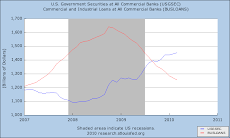


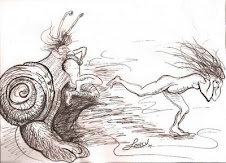





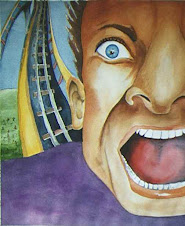
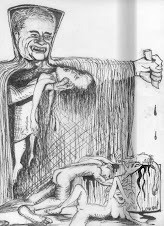


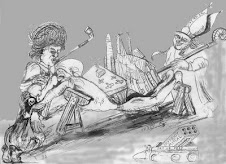
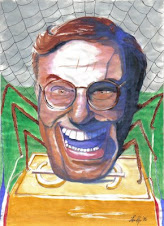



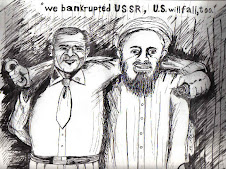

2 comments:
By that t a truism nonetheless that people will follow where someone they see as an expert leadI mean latching on to this or that latest, most innovative idea that some self styled money making guru has put out in the hope it’ll go viral and make them a lot of money off the backs of all the headless chickens who will follow them blindly down a blind alley. Its a shame bus. Even if they lead them to certain disaster, which is what most of the gurus tend to do to their flocks.
The trick is to recognize a shadow when you see it! www.onlineuniversalwork.com
Shadows, by their very nature, are elusive.
Post a Comment